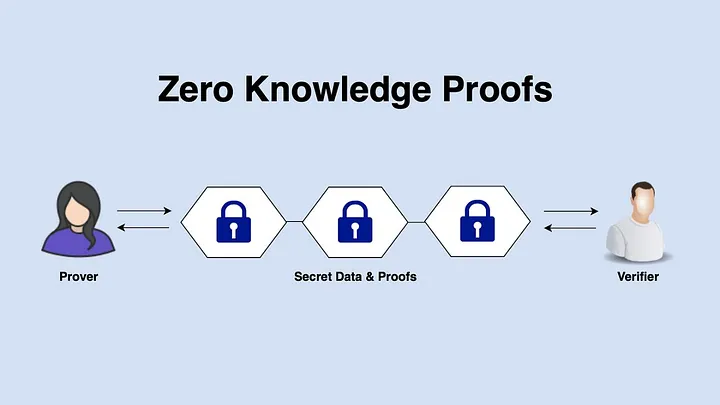1. Introduction to Zero-Knowledge Proofs (ZKPs)
Zero-Knowledge Proofs (ZKPs) stand out as a unique and influential branch of cryptographic methods, enabling proof of knowledge without revealing the knowledge itself. This concept, introduced by cryptographers Shafi Goldwasser, Silvio Micali, and Charles Rackoff in the 1980s, has become a fundamental element in securing privacy in digital spaces. Today, ZKPs serve as a powerful tool in fields where data security is paramount, especially in blockchain technology, which has led to significant adoption in privacy-focused blockchain protocols and decentralized finance (DeFi) applications.
At the core of ZKPs is their ability to create a trustless environment—meaning they eliminate the need for trust between parties. For example, a user can verify they are over a certain age without disclosing their exact date of birth. This unique property is not only useful for blockchain but also for any digital system where confidentiality, integrity, and trust are essential.
2. How Zero-Knowledge Proofs Work
Zero-Knowledge Proofs work based on several key cryptographic principles: completeness, soundness, and zero-knowledge. These criteria ensure that:
- Completeness: The verifier will be convinced if the statement is indeed true, assuming the prover is honest.
- Soundness: A dishonest prover can’t convince the verifier if the statement is false.
- Zero-Knowledge: The prover doesn’t have to reveal any information about the actual data—only the truthfulness of the statement.
To illustrate, consider the classic metaphor of “The Ali Baba Cave.” Here, imagine a circular cave with a locked door accessible only to someone who knows the password. The prover enters the cave from one side, unlocking the door to demonstrate they know the password without revealing the actual word. This simple scenario captures the essence of ZKPs: they enable proof without revealing the specifics.
The mechanics behind ZKPs rely heavily on complex mathematics, such as elliptic curve cryptography, homomorphic encryption, and polynomial commitments. Despite the technical complexity, their application ensures that sensitive data can remain concealed while still providing a means of verification.
3. Types of Zero-Knowledge Proofs
- Interactive vs. Non-Interactive ZKPs:
- Interactive ZKPs require a back-and-forth exchange between the prover and verifier, where the verifier sends challenges to which the prover responds, strengthening the verifier’s confidence. These are less practical for blockchain applications where interaction isn’t feasible.
- Non-Interactive ZKPs (NIZKPs), however, eliminate this exchange, making them ideal for blockchain. The prover can provide proof to the verifier in a single step, which is then stored and reused multiple times, greatly improving efficiency.
- zk-SNARKs (Zero-Knowledge Succinct Non-Interactive Arguments of Knowledge): zk-SNARKs are a type of NIZKP that allows for short, easily verifiable proofs. These are widely used in privacy-focused cryptocurrencies like Zcash, allowing transaction validation without disclosing transaction details, thus securing user privacy.
- zk-STARKs (Zero-Knowledge Scalable Transparent Arguments of Knowledge): zk-STARKs are newer and enhance transparency by removing the need for a trusted setup, a requirement in zk-SNARKs that can create potential vulnerabilities. They are also more scalable and well-suited for systems handling large computations, such as enterprise applications and complex blockchain networks.
4. Applications of Zero-Knowledge Proofs
- Blockchain and Cryptocurrencies: Zero-Knowledge Proofs are crucial in cryptocurrency networks that prioritize privacy. In Zcash, zk-SNARKs allow private transactions by validating balances and transaction details without revealing them on the public blockchain. This private-by-design transaction model appeals to those seeking confidentiality in an otherwise open ledger system. Ethereum, on the other hand, is exploring zk-rollups—a layer-2 solution that uses ZKPs to batch transactions, reducing blockchain congestion while ensuring privacy.
- Identity Verification: ZKPs enable secure and private identity verification. They allow users to prove attributes like age or nationality without sharing personal information. This capability is being used in digital identity platforms and could become standard in online services, finance, and government verification, where KYC compliance is essential but requires discretion.
- Data Sharing and Access Control: In healthcare, finance, and other data-sensitive industries, ZKPs allow verification of data authenticity and compliance without exposing sensitive details. For instance, a healthcare provider could verify a patient’s eligibility for services without accessing or disclosing the patient’s full medical record.
5. Technical Challenges and Limitations
- Computational Demands: Generating and verifying ZKPs can be resource-intensive, as zk-SNARKs, for example, require significant computation. This presents challenges in low-power or decentralized environments, such as IoT networks or lightweight blockchain nodes, where resources are limited.
- Scalability Issues: While zk-STARKs have improved scalability, zk-SNARKs and interactive ZKPs still encounter scalability barriers. Expanding their use to applications like large-scale blockchain ecosystems requires extensive processing power and optimization.
- Transparency vs. Privacy Trade-Offs: Transparency in zk-STARKs comes at the cost of computational complexity, while zk-SNARKs offer greater efficiency but require a trusted setup that may be compromised. Finding the right balance between transparency and privacy is an ongoing challenge in ZKP development.
6. The Future of Zero-Knowledge Proofs in Blockchain and Beyond
The potential of zero-knowledge proofs continues to unfold as research advances. Emerging trends include:
- Recursive zk-SNARKs: These allow multiple proofs to be verified collectively, streamlining processes that would otherwise require individual proof verification. This feature shows promise in scaling ZKPs for complex blockchain systems.
- Broader Applications in Privacy, Security, and Interoperability: As digital privacy laws and regulations evolve, ZKPs are likely to become foundational to compliance in areas such as secure data transfer, digital rights management, and even in voting systems where privacy is paramount. Interoperability could also benefit, with ZKPs enabling private transactions across disparate blockchain networks.
- Impact of Regulatory Compliance: Privacy-preserving technologies like ZKPs add layers of complexity to regulatory compliance, especially regarding anti-money laundering (AML) and know-your-customer (KYC) requirements. If regulatory bodies incorporate privacy-enhancing protocols like ZKPs, wider adoption could ensue, blending privacy with compliance.
Zero-knowledge proofs have emerged as a revolutionary approach to data privacy and security in the digital era. By offering a way to prove authenticity without revealing specifics, ZKPs hold the potential to transform not only blockchain but any application that depends on secure, private data sharing. The evolution of ZKPs into zk-SNARKs, zk-STARKs, and beyond indicates a continuous trajectory toward enhancing privacy, transparency, and scalability in digital interactions. As technology and research progress, zero-knowledge proofs could redefine how digital trust is managed, empowering secure interactions across decentralized and centralized platforms alike.
Read morehttps://cointelegraph.com/news/crypto-privacy-zero-knowledge-proofs-protocols











